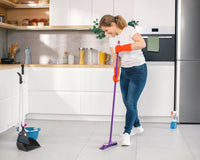First off, congratulations on your decision to improve your mobility with a bariatric walker rollator! If you didn't know, a bariatric walker rollator is a mobility device that effectively assists people with limited mobility to move around. It is a combination of a walker and a wheelchair.
The bariatric walker rollator has a seat and a set of wheels, and it is propelled by the user’s legs. It is an alternative to a wheelchair for people who are able to walk but who need assistance with balance or with walking long distances.
In part one, we tackled different types of walkers along with several factors that would be important when it comes to picking a bariatric walker rollator. For part two, let's discuss rollator options, portability, handle height, and storage capacity.
Continue reading to learn more.
1) Specialty Rollator Options
There are many different types of specialty rollators available on the market today. Whether you need a rollator for outdoor use, a heavy-duty model, or a Hemi walker, there is sure to be a perfect option for you.
Let's look into different specialty rollators:
- Outdoor Rollators. If you enjoy spending time outside, an outdoor rollator can be a great option. These rollators are designed to handle rough terrain, making them perfect for taking on nature trails or exploring your neighborhood. Many outdoor rollators also come equipped with features like large wheels and a basket, making them even more versatile.
- Heavy-Duty Walkers. Heavy-duty walkers are designed for people who need extra support when walking. They typically have a wider base and a higher weight capacity than standard walkers, making them ideal for people who are taller or heavier. Some heavy-duty walkers even have features like built-in seats or storage baskets for better functionality.
- One-Handed Walkers. One-handed walkers, also referred to as side walkers and side steppers, are a type of walker that is designed for those who have limited mobility on one side of their body, specifically those with hemiplegia. They feature a smaller base that makes it easy to maneuver and a seat that can be used when needed.
2) Overall Portability
Before purchasing a walker rollator, make sure that it is easy to transport, as portability is one of the most important factors. If you’re looking for a rollator that you can take on the go, you’ll want to ensure that it’s lightweight and easy to fold. Some rollators even come with a carrying case or travel bag to make it even easier to take with you.
3) Handle Height
The height of the rollator's handles determines how comfortable the device is to use. If the handles are too low, you may have to stoop over to push the device and get back pain. If the handles are too high, you have to reach up and get shoulder pain. The ideal handle height will allow you to push the device while keeping your back and shoulders in a neutral position.
4) Storage Capacity
Most rollators come with a helpful storage basket or tote bag that can be attached to the device, but some models have more storage capacity than others. If you plan on using your rollator for shopping or running errands, make sure that it has appropriate storage space to accommodate all of your belongings.
Conclusion
It's a must for one's bariatric walker rollator to be easy to fold, simple to maneuver, functional in storage, and more. By remembering these factors, you can surely find the perfect bariatric walker rollator for your needs.
Considering buying aluminum walkers? Cart Health was built to make it easier for you to find the products you need at prices you can afford, providing custom-tailored product suggestions to help you live your life. Order now!









